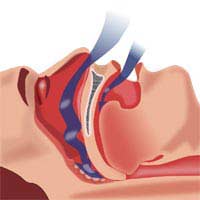Sleep Apnea and Morning Headaches

Apart from self-induced hangover headaches, most head pain tends to develop during the day. Some people who have severe migraine attacks may find their headaches persist at night and rarer forms of head pain can actually wake you from sleep. Apart from these severe headaches, most mild, tension type headaches come on due to tension, tiredness and stress. So, waking up every morning with a headache that feels like an end-of-the-day complaint is cause for concern.
Do you Suffer from Sleep Apnea?
Sleep apnea is one of the most common underlying factors that lead to morning headaches. Other symptoms are feeling constantly tired, even in the morning and whatever time you have gone to bed. Even though you ought to feel refreshed at the end of a night’s sleep, you don’t. Snoring loudly is another sign that you may be having some attacks of sleep apnea – so if you are tired and irritable during the day and your partner is complaining about the snoring, it is a good idea to find out if this is the explanation for all of these problems.One simple test is for your partner to agree to listen to you when you are asleep. If you normally snore, this may be unavoidable anyway. If you snore and then stop, only to suddenly breathe in and then resume snoring, this is a good indication that you may be having attacks of sleep apnea.
What is Sleep Apnea?
Medically, sleep apnea is regarded as a sleep disorder but it is one that the sufferer may be completely unaware of. During the night, instead of phasing through the different types of sleep that you need to have to get a complete rest, you sleep lightly. Every so often, your breathing stops and as carbon dioxide starts to build up in your blood, your brain prompts you to start breathing again by taking a gasp of air. When this happens, you aren’t aware of it and you usually don’t wake up completely – but you aren’t soundly asleep either.At the end of the night, this may have happened a dozen times, so the quality of sleep that you have had is very poor.
What Causes Sleep Apnea?
One common cause is being overweight. If you are well above the normal range for weight, your tissues pull down on the tissues in the neck, which tend to sag during sleep anyway. The noise of snoring is caused by air going in and out over these loose tissues, which vibrate. The tissues at the back of the throat can relax so much that the airway becomes blocked, particularly if you sleep on your back.In other people, loose muscles can lead to the problem even when weight is not an issue.
Is Sleep Apnea Dangerous?
It can be. If left undiagnosed, there is a risk that the spells during which you stop breathing will lengthen and you can lose consciousness. Sleep apnea can prove fatal but is rarely listed as a cause of death. One very large study in the USA found that men with sleep apnea were five times more likely to die – but from a heart attack or stroke. It could be that the lack of oxygen during sleep was an important factor.If you do show the symptoms of sleep apnea and your partner has noticed you snoring, going quiet and then suddenly doing a very loud snore perhaps even gasping in your sleep, it is a good idea to explain all of this to your GP. You will probably need to visit a sleep clinic for an investigation and diagnosis and then suitable treatment can be planned.
A first step may be to lose weight, stop smoking and to cut out alcohol or any sleeping pills that you have been taking to get a good night’s sleep. These will only make the problem worse. You can also force yourself to sleep on your side not on your back by the old trick for snoring – sewing a tennis ball into the back of your nightwear. If that still doesn’t cure your sleep apnea, or you need treatment while you are losing weight, you can also use a continuous positive airflow pressure device. This mask is worn during sleep to provide a positive air stream to keep the airways open and it immediately results in a much better quality of sleep. It is also a very good cure for sleep apnea headaches.






